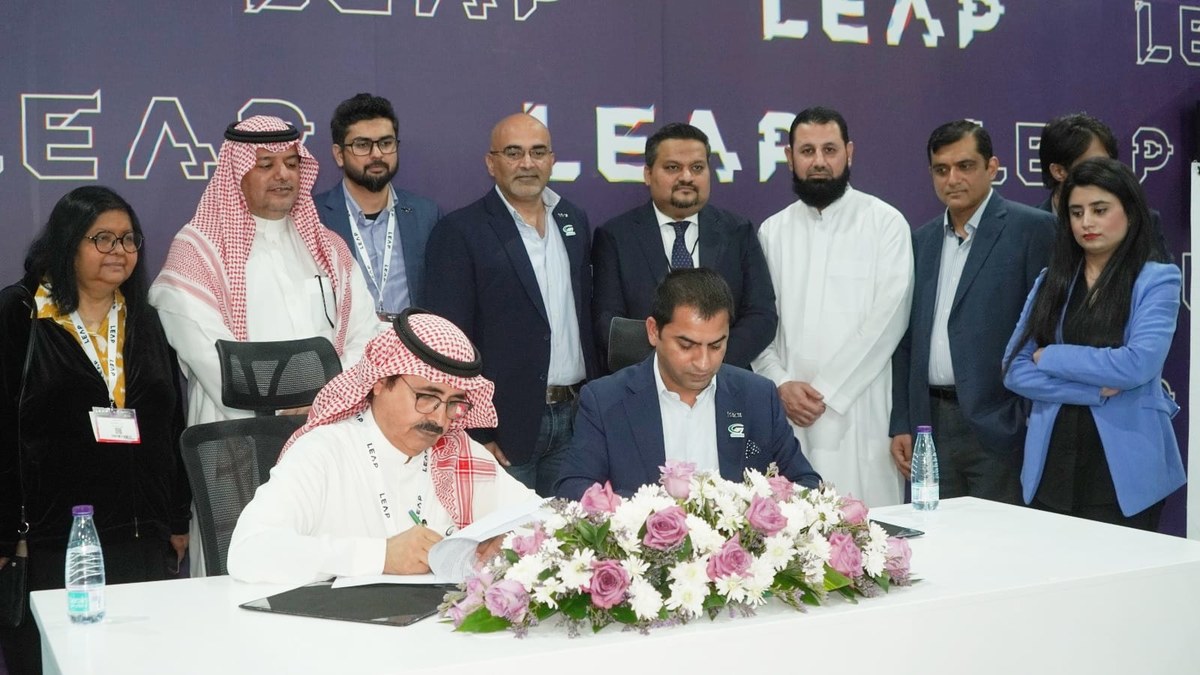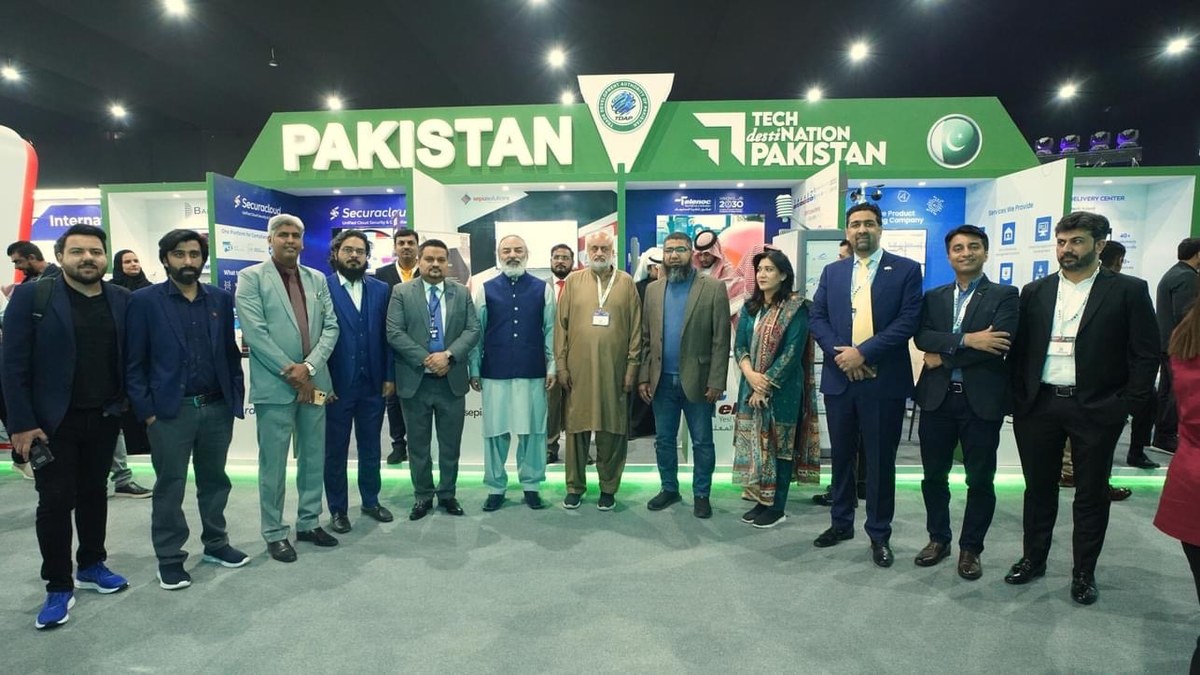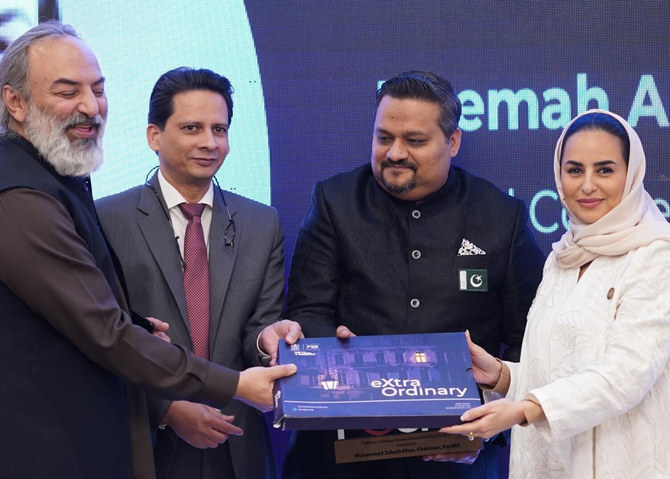ISLAMABAD: Pakistan’s leading IT and telecom companies spoke about the “exciting and overwhelming” response they received from the Saudi market at the annual LEAP tech conference on Wednesday, where they signed various agreements with the Kingdom’s top companies relating to the export of services and joint ventures.
LEAP 2023 is a global tech event that aims to bring together the world’s leading companies, innovators and experts “to discover new ideas, build new partnerships, and connect with inspiring mentors and investors and tap into the limitless potential of tech to build a positive future,” the Pakistan Embassy in Riyadh said in a statement earlier this week.
According to LEAP organizers, over 100,000 tech innovators and leading experts from around the world gathered at the event. There, they interacted to discover new ideas, build new partnerships, and connect with inspiring mentors and investors, the organizers said.
Numerous technological companies from around the world are participating in the four-day event which will end on Thursday.
Pakistan’s mission in Riyadh said 18 top IT and telecom companies from the South Asian country and 10 startups from the fields of artificial intelligence (AI), blockchain, crypto, robotics, 3D printing and other areas are taking part in the LEAP event this year.
The Pakistani companies are taking part in the conference in collaboration with the Trade Development Authority of Pakistan (TDAP), the Pakistan Software Export Board (PSEB), and the Pakistan Software Houses Association (P@SHA).
“We have got an excellent and overwhelming response from the Saudi market at LEAP,” Mohsin Ali, chief executive officer of Inbox Business Technologies, told Arab News over the phone from Riyadh.

Mohsin Ali, (right) CEO of Inbox Business Technologies and Dr. Fahd A. Al Damer, (left) CEO of the Saudi Gissan company, sign MoU for collaboration between the two companies in Riyadh, Saudi Arabia on February 7, 2023. (Photo courtesy: Mohsin Ali)
“And we also signed a memorandum of understanding (MoU) on Tuesday about a strategic partnership between Inbox and Gissan Group of Saudi Arabia,” he added.
He said as per the MoU, Inbox Business Technologies would provide support to the Saudi company in the fields of cybersecurity, artificial intelligence, and robotics. Ali said his company was also negotiating three other projects related to IT services which would mature after a couple of meetings.
P@SHA Chairman Muhammad Zohaib Khan said their B2B (business-to-business) connect event at the conference on Tuesday night was attended by numerous representatives of Saudi companies where the possibilities of joint ventures and collaborations were discussed.

A group photo of representatives of Pakistani tech companies with Pakistan's Ambassador to Saudi Arabia Ameer Khurram Rathore (sixth from left) at LEAP23 in Riyadh, Saudi Arabia on February 6, 2023. (Photo courtesy: P@SHA)
“Around four Pakistani companies have already signed MoUs with Saudi companies and many more are in the advanced stage of discussions,” he told Arab News.
Saudi Digital Cooperation Organization’s (DCO) secretary-general attended the event as the chief guest, Khan said.
“The future collaboration between P@SHA and DCO was also discussed so that we can increase Pakistan’s IT exports to the gulf countries,” he said, adding that Saudis are doing a lot of investment in artificial intelligence, cybersecurity, and mechatronics.
This, he said, provided a good opportunity for Pakistani companies to capture their share in it.
Adil Mukhtar, assistant director at TDAP, described LEAP as a gateway to access the big and expanding Saudi IT market.
“The Pakistani pavilion performed very well this year and remained the center of attraction of the visitors,” he told Arab News, adding that many Pakistani companies were signing deals that would mature in the next few days.
“These deals will add up to Pakistan’s exports of IT and telecom services, and bring precious foreign exchange to the country,” he added.
Last year, 24 Pakistani companies participated in the first LEAP edition and a majority of them secured a lot of business from Saudi Arabia, Mukhtar said. He said due to many of these companies opened their liaison offices in the Kingdom to enhance their interaction with the people in Saudi Arabia, he said.
“Pakistan is like one of the major winners of LEAP,” Mukhtar added.
Dr. Hafiz Imran, the head of Pakistani IT solutions company TeleNoc, said the Saudi market was a developing one that was interested in working with Pakistani companies. He said this year’s LEAP tech conference featured a lot of companies and individuals who were looking for joint ventures and business opportunities.
“Saudis have a lot of trust in Pakistani companies, especially in IT and telecom sectors because our companies provide quality services at low cost, which suits them,” he told Arab News.












